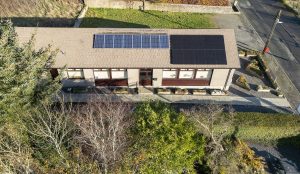Location: Udny Station, Aberdeenshire
Technology: Air to air source heat pumps, solar photovoltaic (PV) panels, battery storage
CARES funding: £25,130.52 capital grant
Date installed/operational: 18 February 2025
Background
Udny Station Community Association was struggling with rising electricity costs at its community centre. In 2023/24 these costs made up 78% of its total spending, mainly because the centre used inefficient electric heaters.
Project objectives and aims
The main aim of the project was to reduce the centre’s electricity costs and carbon footprint. Udny Station Community Association contacted Business Energy Scotland to get an energy assessment report to find out what improvements they could make.
The report suggested that Udny Station Community Association:
- Upgrade the thermal insulation in the loft
- Extend the existing solar PV panels
- Replace the existing heaters with air source heat pumps.
Outcomes and achievements
Udny Station Community Association applied to the Scottish Government’s Community and Renewable Energy Scheme (CARES) and got a capital grant of £25,130.52. Funding from CARES and the Hill of Fiddes Community Fund was essential for the project.
The project started in the summer of 2024 with the replacement of the old loft insulation to bring it up to modern standards. Afterwards, an additional 20 solar PV panels were installed, along with a battery storage system. Udny Station Community Association will use any excess energy it generates to heat the centre’s hot water.
The final phase of the project was completed in February 2025 with the installation of two air to air source heat pumps. Udny Station Community Association is expecting a 66% decrease in the centre’s carbon emissions because of the project. The community is already enjoying the benefits, noting how much more comfortable the hall feels with the timed heating and hot water.

Lessons learned
One of the biggest challenges for Udny Station Community Association was getting all the paperwork ready for building warrants and planning permission. As the community centre wasn’t classified as a domestic building, they needed approval from the council, and even as a registered charity they had to cover these costs.
Published July 2025.